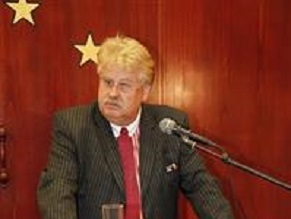|
World Jewish News

Elmar Brok, German Christian Democrat and European Parliament foreign affairs committee chairman
|
MEPs to debate Syrian refugee crisis
17.05.2013, Israel and the World MEPs are due to debate the impact of Syrian refugees on neighbouring countries next Wednesday at a European Parliament (EP) plenary session in Strasbourg, as UN figures estimated the ever-escalating number of Syrian nationals seeking refuge in bordering states at 1.3 million Tuesday. An additional 4.25 million Syrians are thought to be internally displaced as a result of the two year-long civil conflict.
Ahead of next week’s topical debate, German Christian Democrat and EP foreign affairs committee chairman Elmar Brok said the refugee question was “critically important and morally important” to Europe, due to the strain it placed on the resources of its southern border’s neighbours including Jordan, Turkey and Lebanon, as he concluded that “we have many reasons to be concerned” at the risk of the conflict spilling over, in an official statement Thursday.
Conceding that in the eyes of the international community, “the main concern is the European inability to support more strongly certain parts of the opposition”, he cautioned against allowing Syria to become a battlefield for destabilising forces such as the Iranian regime and Saudi Arabia, as he insisted the EU “should do much more to help the refugees within Syria and outside Syria for humanitarian reasons but also for stabilising the region”.
The EP debate will follow Wednesday’s General Assembly vote for its strongest yet resolution on the Syrian issue, condemning Bashar al Assad’s authoritarian regime’s increased used of heavy weapons, as well as its ongoing “widespread and systematic gross violations of human rights and fundamental freedoms”.
The EU has become an increasingly fierce critic of the UN’s inability to reach a consensus position on the escalating crisis, with the Security Council in particular coming in for a degree of censure over its permanent members’ Russia and China repeated vetoes of council resolutions to hold to Assad to account for alleged human rights violations.
Echoing Brok’s call for the EU to pursue a humanitarian solution in Syria last month, EU Commissioner for Humanitarian Aid Kristalina Georgieva delivered an unflinching call to action to the EU as she urged it to help “to bring this to the next level and make it a UNSC Resolution in defence of the Syrian people and of the people helping them on the ground”.
Addressing a joint meeting of the European Parliament’s foreign affairs and development committees, she further called for increased support of Syria’s neighbouring countries struggling under the weight of housing a disproportionate number of Syrian refugees since the start of the Syrian crisis two years ago, as she warned of “the very real risks of an enormous tragedy should the borders be closed indefinitely” between Syria and neighbouring Jordan and Lebanon.
“All, collectively, we have the moral imperative to do help alleviate people's suffering on the humanitarian front. This is essential inside Syria and in the region. We must act now, proactively, before it is too late, to assist neighbouring countries which are bearing the strain of refugees, especially Jordan and Lebanon,” she continued, as she called on the EU to defend its hard-fought and won international humanitarian laws.
NATO Secretary-General Anders Fogh Rasmussen was an even more outspoken critic of the Security Council’s failure to stem hostilities at a joint debate on the future of European defence cooperation with NATO with the European Parliament’s defence and foreign affairs committees in Brussels earlier this month, as he insisted a crucial political solution to the crisis “would take agreement among the five permanent members of the UN Security Council...(and) a strong and unified message from the international community”.
Describing developing events in Syria as “outrageous”, he regretted that the UN Security Council has to date “failed to reach a consensus”, as he insisted it already had a necessary political framework to put into use.
The EU has equally been forced to answer to criticism of its handling of the Syrian crisis, with EU foreign policy chief telling a plenary session last September not to “leap to conclusion that unless we engage in military solutions we are inactive”.
Responding to accusations from various MEPs of the EU’s powerlessness over the escalating situation, characterised by Dutch liberal member Marietje Schaake’s allegation that the EU’s reputation as a global player was undermined by its repetitive rhetoric and that “words are no longer enough for the Syrian people”, Ashton insisted:
“The EU is respected for what we do to try to support the people of Syria and to try to find a way through this incredibly difficult challenge. Because frankly, if it was easy, we would have done it by now.”
by: Shari Ryness
EJP
|
|
